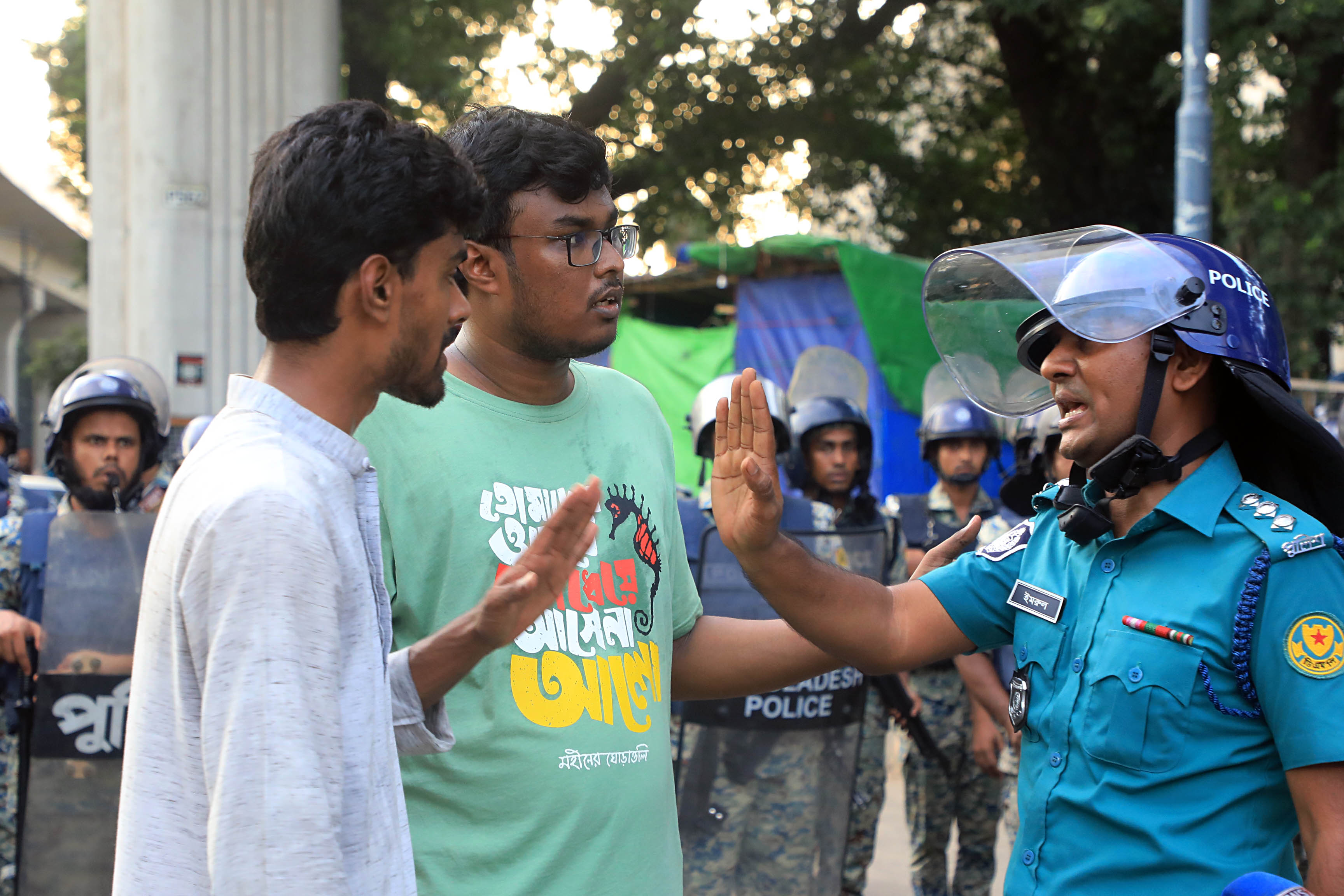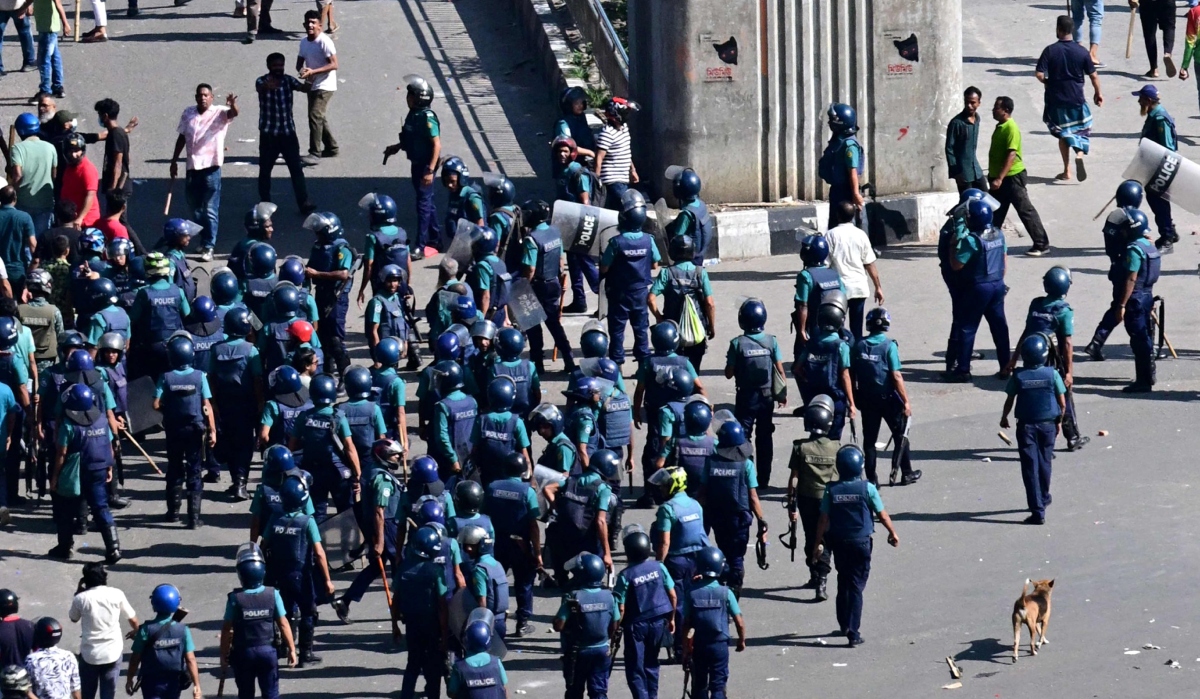From force to service: Rethinking policing in Bangladesh

The police in Bangladesh, a remnant of colonial design, became militarised during the recently deposed regime. Established under the Police Act, 1861, drafted in response to the 1857 uprising, the force was never meant to protect citizens but to control them. Its model followed the Royal Irish Constabulary, a centrally directed, armed, quasi-military institution created to suppress dissent rather than foster trust.
The deposed administration cemented this institution not as a service for the people, but as an instrument for clinging to power. The July uprising in 2024 brutally exposed this legacy when police responded to unarmed protesters with semi-automatic rifles, submachine guns, and battlefield-grade ammunition. As a result, the leading figures of the police had to flee away as a party to the collapsed regime.
An investigative report by The Daily Star revealed how police stockpiled lethal weapons in the years preceding the uprising. Between 2021 and 2023, Tk 240 crore was spent on firearms such as submachine guns and semi-automatic rifles, while Tk 191 crore was allocated to non-lethal equipment. The ratio of lethal to non-lethal procurement was seven to one.
When crowds filled the streets in July last year, these arsenals were unleashed. Semi-automatic rifles were fired into unarmed gatherings. Hundreds of young lives were lost, and a generation was traumatised. Recent incidents, too, show no signs of corrective measures within the police force. It still remains a force of coercion, not a protective civil service.
History offers a different path. In Northern Ireland, following the Good Friday Agreement of 1998, the Patten Commission fundamentally redesigned and decentralised policing to ensure inclusivity and establish accountability mechanisms through a policing board, placing community engagement at the heart of policing.
In Britain, the originator of this archaic system, policing has evolved into a devolved model, with no national police. Instead, 43 territorial police organisations are overseen by locally elected police and crime commissioners (PCCs), with powers including control over the budget and appointment of the chief constable. This creates direct accountability to the community from police leadership, founded on the principle that police derive legitimacy from public consent rather than state power.
Other societies have also showcased how policing can shift from repression to service. For example, in Japan, children greet police officers with trust rather than fear. In Denmark, Germany and Canada, community policing fosters partnerships between officers and citizens, emphasising prevention over punishment. Surveys in Finland consistently rank the police among the most trusted public institutions.
Closer to home, in Sri Lanka, which recently experienced political turmoil, the establishment of an independent National Police Commission represented a step towards depoliticisation through oversight of recruitment, promotions and discipline. India's Supreme Court issued binding directives in the 2006 Prakash Singh case, calling for state-level Police Complaints Authority, fixed tenures for officers, and separation of investigation from law and order duties. However, most Indian states have only partially complied after nearly two decades, demonstrating how reform falters without political will.
In Africa, Sierra Leone undertook comprehensive post-war reform, creating an Independent Police Complaints Board and community-based "Local Needs Policing" that shifted emphasis from enforcement to partnership.
Following the 2014 killing of Michael Brown in Ferguson, Missouri, The President's Task Force on 21st Century Policing formed by the Obama administration recommended body cameras, community oversight, and demilitarisation. While some cities implemented changes, resistance from police unions and political divisions limited reform momentum.
Acknowledging public anger, the interim government in Bangladesh formed the Police Reform Commission in October 2024. The commission's report, submitted in January 2025, recommended, aligned with UN peacekeeping principles, mandatory body cameras, protection against warrantless searches, interrogation reforms, and transparent recruitment measures. Unfortunately, that too has not been figured in the discussions of the National Consensus Commission.
The real question is not how to enhance efficiency but how to transform the very ethos of policing. The Police Act, 1861 designed the entity for control rather than as a civil service for people. Genuine reform requires building a civil service dedicated to the people. This cannot be achieved through piecemeal, top-down adjustments alone. It demands devolution, moving authority and accountability closer to the communities the police are meant to serve. Without independence, reforms risk remaining cosmetic, subject to vested interests, as decades of politicisation have hollowed out the police institution.
Transforming police into a civil service requires more than new training or equipment. It demands, at least, four structural changes: creation of an independent police commission with constitutional authority, free from the home ministry's control; repeal of the colonial Police Act, 1861 and the Code of Criminal Procedure, 1898 by rights-based legislation; an institutional cultural shift, treating citizens as partners rather than adversaries; and a pragmatic phase-wise pathway for devolution.
The fear expressed by home ministry officials that "there will be no controlling authority" if an independent commission is created exposes the problem. Authority should not rest in a monolithic ministry but in the people, expressed through democratic, community-led institutions at multiple levels. A centralised entity can be easily manipulated for vested purposes. A devolved civil service, rooted in community, is more resilient to abuse.
The police represent the state's most visible face. For too long in Bangladesh, that face has triggered fear as a force, rather than trust as a civil service. Reform requires transforming the very meaning of policing in a democratic republic from an authoritarian order. Imagine a future where schoolchildren greet police officers with confidence rather than anxiety. That makes the police a civil service.
Dr Rashed Al Mahmud Titumir is professor in the Department of Development Studies at the University of Dhaka.
Views expressed in this article are the author's own.
Follow The Daily Star Opinion on Facebook for the latest opinions, commentaries and analyses by experts and professionals. To contribute your article or letter to The Daily Star Opinion, see our guidelines for submission.




 For all latest news, follow The Daily Star's Google News channel.
For all latest news, follow The Daily Star's Google News channel. 



Comments